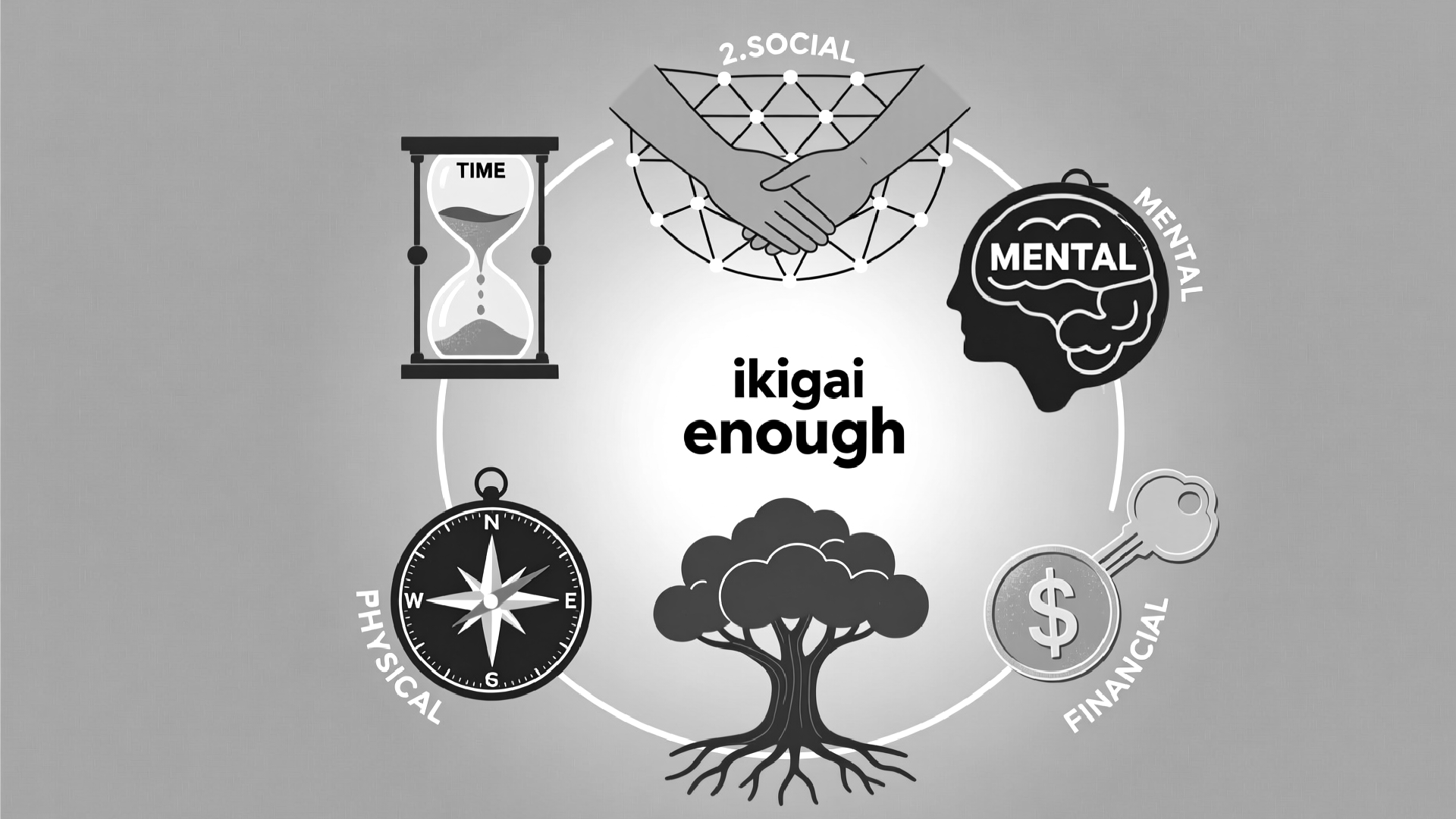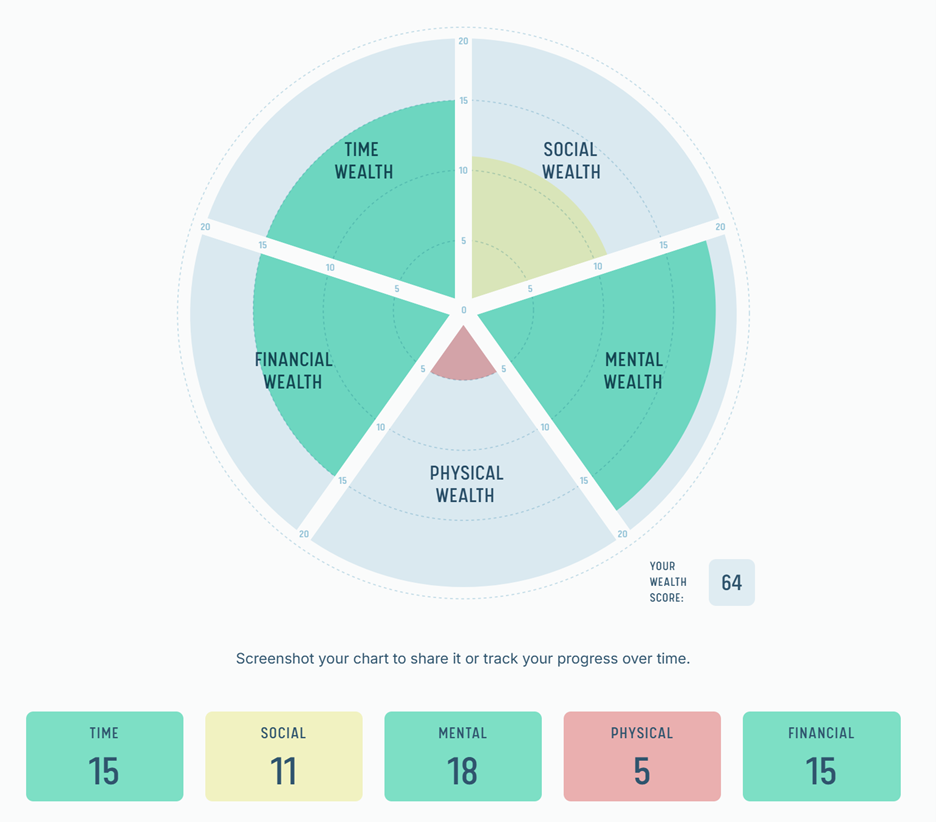The Five Types of Wealth by Sahil Bloom.

Never Let the Quest for More Distract You From the Beauty of Enough
"You're going to see your parents fifteen more times before they die."
That stark calculation stopped Sahil Bloom cold. Mid-twenties, crushing it at Goldman Sachs, living the life he'd always planned. But his friend's simple math—visiting once a year, parents in their mid-sixties—exposed a truth he'd been running from: time isn't infinite, and money can't buy it back.
The 5 Types of Wealth isn't another productivity hack or get-rich-quick scheme. It's a reckoning with what actually matters when you strip away the status games and social media highlight reels.
The Pyrrhic Victory of Modern Success
Bloom interviewed over a thousand successful people with a combined age of more than 1,000 years. Not one mentioned money as their key to happiness. Time, relationships, purpose, and health dominated every conversation.
Yet we keep optimizing for the wrong scoreboard.
"How many times has the thing your younger self dreamed of become the thing you complain about once you've gotten it?" Bloom asks.
This is the modern Pyrrhic victory—winning battles that cost you the war.
Your New Scoreboard
Bloom argues for measuring wealth across five dimensions, not one:
- Time Wealth is about awareness and control. Warren Buffett has billions, but would you trade your remaining time for his?
"Warren Buffett is, at the time of this writing, ninety-four years old," Bloom notes. "It doesn't matter how much money, fame, or access he has—you probably wouldn't agree to trade your remaining time for his."
The answer reveals what you actually value. Most of us are scattered, treating every demand as urgent. But focused attention creates exponential returns. Newton's "miracle year" happened during plague isolation—when he couldn't be distracted, he revolutionized physics, mathematics, and astronomy in twelve months.
- Social Wealth means knowing who'll sit in the front row at your funeral. Research consistently shows supportive relationships predict happiness more than income. Yet we move for lower taxes, sacrifice family time for promotions, and let friendships fade.
"Being present and spending time with those you love is the most important thing in the end," Bloom writes. "Having the people you love see you work hard on things you care about is a principle they'll remember for the rest of their lives."
The loneliness epidemic isn't accidental—it's architectural. We've built lives that systematically erode our most important connections.
- Mental Wealth is your ikigai—the overlap of what you love, what you're good at, and what the world needs from you. Purpose provides daily meaning and aligns short and long-term decisions. Without it, you're just reacting, never creating.
- Physical Wealth is treating your body like a house you'll live in for seventy more years. Sleep, movement, nutrition—the boring basics matter more than any biohack. You can't compound anything if you're running on empty.
- Financial Wealth is having enough. Not billionaire-enough. Just enough to stop worrying, invest for the future, and use money as a tool to build the other four types of wealth.
The Trap Nobody Warns You About
The problem isn't wanting financial success. It's sacrificing everything else to get there, only to discover you've built a prison.
Bloom calls this the "Zone of Danger"—pursuits you're competent at but that drain your energy. You get positive feedback, so you keep doing them. But competency without energy is a trap. You're good at something that's killing you slowly.
The goal isn't to quit your job or become a minimalist. It's to operate in your "Zone of Genius"—where energy and competency align—and use your financial wealth as a tool, not the destination.
This Was Enough
The book's most powerful moment is subtle. Bloom describes reprioritizing his health, focusing on the basics of movement, nutrition, and sleep. Then this:
"This was enough. Never let the quest for more distract you from the beauty of enough."
That line hits different when you realize he wrote it after achieving the success most people dream of.
Steve Jobs understood this at the end: "Almost everything—all external expectations, all pride, all fear of embarrassment or failure—these things just fall away in the face of death, leaving only what is truly important. Remembering that you are going to die is the best way I know to avoid the trap of thinking you have something to lose. You are already naked."
The Work That Matters
The 5 Types of Wealth includes practical frameworks: the Life Razor (a single statement defining your presence this season), the Energy Calendar (identifying what creates vs. drains energy), the Relationship Map (assessing quality and frequency of connections).
But frameworks don't change lives. Reckoning does.
The question isn't whether you're rich. It's whether you're building the wealth that actually compounds into a life worth living.
You already know the answer.
The only question left is: what are you going to do about it?
Sahil has a free quiz at: https://The5typesofwealth.com/quiz

He also has a free workbook, that I've shared via dropbox.

